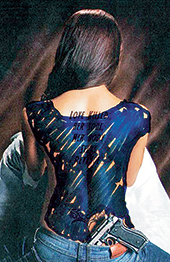 |
| The Hate Story poster with Paoli Dam’s bare back covered in blue ink |
The West Bengal Board of Censorship, whose existence few were aware of until it covered Paoli Dam’s bare back in blue ink on the posters of Hate Story, has been playing publicity police for every Friday release since the mid-seventies.
It remains till date the lone state-level censorship committee in the country, operating under the film directorate with six members whose job is to scan eight to 10 film posters on an average every week and decide whether Bengal should see what the rest of the country would without a coat of prude paint.
When even body art like that on Paoli’s posters fails to meet its standards of propriety, the committee is empowered to ban the publicity material. Six posters of Hate Story, which hits the theatres on Friday, were passed with amendments and two were banned.
Last December, a poster of Vidya Balan in a red sari as the sassy Silk from The Dirty Picture was banned because it had a “hint of cleavage” and “three men (Naseeruddin Shah, Emraan Hashmi and Tusshar Kapoor) in contact with her”, according to Debashish Dey of Aum Moviez.
A poster of the blink-and-you-miss Blood Money, a film featuring Kunal Kemmu that released last month, was banned because it had bikini-clad women hovering around the hero in a pool.
So why does Bengal need this extra layer of protection that other states can do without? “We have a culture to safeguard and a sense of responsibility towards the people of this state,” says Debananda Sengupta, censor officer in the West Bengal Board of Censorship.
“As far as publicity material for films are concerned, this committee was founded to ensure that nothing that can create an adverse impact on impressionable minds is made public,” he adds.
The committee, which has been unchanged for the last four years, owes its existence to the West Bengal Compulsory Censorship of Film Publicity Materials Act that came into force in 1974. A similar panel had been set up in Tamil Nadu a couple of years ago, but was scrapped after a few months.
“Tamil Nadu realised early that this kind of censorship curbs freedom of expression and also causes losses to producers and distributors,” says Pradeep Dey, chairman (exhibitor section) of the Eastern India Motion Picture Producers’ Association.
Everywhere except Bengal, it is left to the Indian Motion Picture Producers’ Association to take a call on publicity content. Most are usually passed without changes.
Sometimes distributors. don’t bother spending on new posters for the “mofussil areas”, knowing that the censors wouldn’t be snooping around there. “Obscenity is subjective. The West Bengal Board of Censorship is an outdated institution manned by people with myopic views,” complains Pritam Jalan of Kushagra Arts, the regional distributors for Hate Story.










